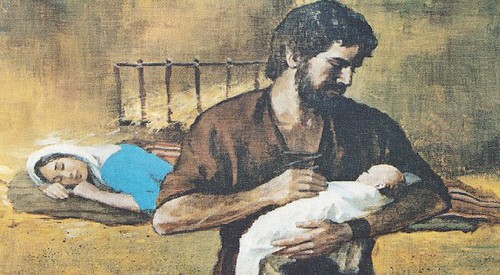It seems popular these days to speak of love but to do so without speaking of the problem and consequences of evil. In my view, one cannot know the fullness of love without understanding just how undeserving we are of it.
One postmodern innovator notes that the Bible uses the word heart 743 times and that this is significant; that God is trying to tell us something. I agree. That report alone wouldn't normally garner my attention but this particular individual has a skewed definition of love. He, and many like him, also deny the reality of Hell in spite of Scripture’s use of the word 331 times and Jesus' over 70 references to it.
Many like this postmodern cannot conceive of the idea that error can be confronted and that consequences and/or discipline can exist in an environment of love. I think the opposite of them. I contend that only in that kind of environment can true love be known.
Related to this, one of these postmoderns proffers that “spanking” is abuse. Of course he does – his start point is that discipline and consequence are unloving. As I observe some parents, with or without spanking, I’ve seen abuse. It’s not necessarily the format of the discipline. I think the key is the spirit and intent by which any form of discipline is administered. Confrontation should be loving, properly motivated, with right end-goals in mind.
David realized the magnitude of his sin only after being confronted by the prophet Nathan (2 Samuel 12.7-12). It was only in his repentance that God would forgive David (2 Samuel 12.13). But even after forgiveness there were severe consequences; violence in his family (2 Samuel 12.10), death of his baby (2 Samuel 12.14), his son raped his daughter (2 Samuel 13.1-22), another son killed by a son (2 Samuel 13.23-33), and finally a son tried to take over his kingdom (2 Samuel 15-18).
God does in fact discipline but this is not for the purpose of punishment, it is for his glory and our future joy. This is one method used by God to train and teach. In fact, I would be very concerned if not disciplined by God (Hebrews 12.5-12; Proverbs 3.12). Please note that verse 6 uses both discipline and chastise – the second of which implies that it will be painful.
I have a friend who was married, divorced, and remarried. His first marriage was a sinful situation and in that he had two children. Both of them grew up to be wild. He is quick to tell how God has forgiven him for the sins in his first marriage but the consequences of that, his insufferable girls still remain – and he is glad. He looks forward to the day of their salvation and reconciliation with him and God.
Why does God do this? He does it for our own good and to show His glory (Hebrews 12.10-11). The postmodern mind cannot understand this so they simply handle it as they do other portions of Scripture; they dismiss it.
They miss that discipline is the loving correction of a parent and it doesn’t equate to penalty that is the required price for an offense.
Chris Brauns offers this as a definition of God’s forgiveness: A commitment by the one true God to pardon graciously those who repent and believe so that they are reconciled to him, although this commitment does not eliminate all consequences.




